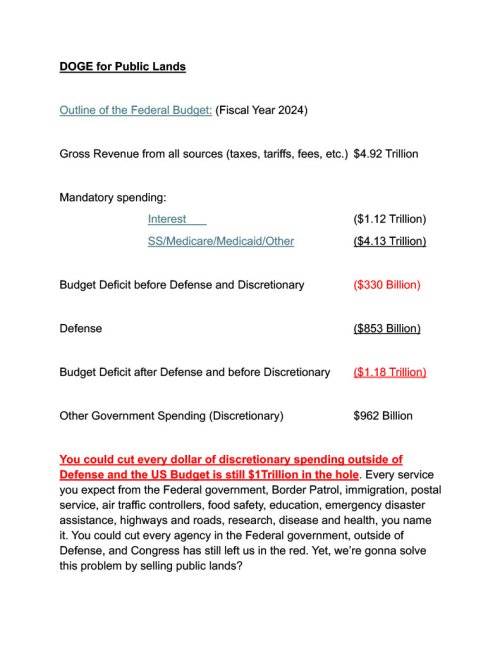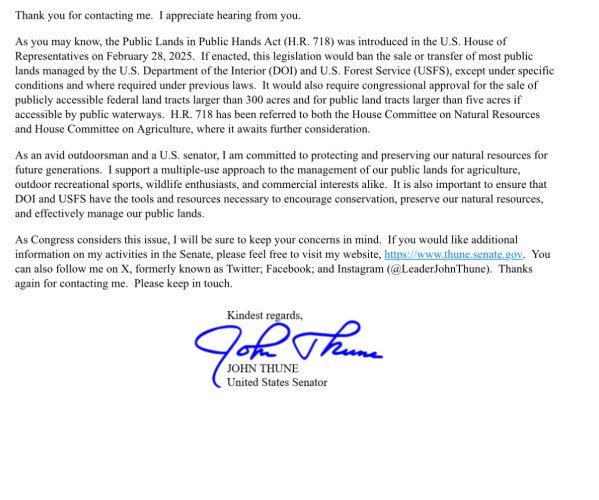The term "government efficiency" is historically a contradiction. Congress makes sure that government cannot be efficient, whether by getting proper returns on government assets or by spending government money in ways that get the best ROI.
A stunning number of things have crossed my desk that last two weeks focusing on public lands as somehow the reason Department of Ag (Forest Service parent department) and Department of Interior (BLM and USFWS parent department) having budget problems. The number of creative (devious being a better term) ways some are trying to justify their long-held desire for selling some public land is stunning. Many of them I don't even both with, as they are so far out in the weeds.
Marcus asked me to layout the Federal budget in the most simple terms possible and see what USFS, BLM, and USFWS contribute to the budget crisis in their corresponding parent agencies. I did that. The outcome is as expected.

I'll be honest, I'm tired of this public land topic being front and center in the minds of so many in DC as a way to solve some budget woes. I suspect exhaustion is part of intentional tactics on the other side. If that is a tactic, I think it is working.
As Senator Martin Heinrich told me in the podcast we will release next week, "If we lose just once, we might lose forever." I'm not interested in losing even once on public lands, so we continue to provide information we think is helpful for our audience to sort through the smoke screens that somehow selling some public lands will solve Congress' fiscal irresponsibility and dereliction of duty.
Here is a Fresh Track Weekly video that goes over the high level items at Ag and DOI that would be in the $Billions if DOGE was serious about "Government Efficiency," however oxymoronic that term is.
A stunning number of things have crossed my desk that last two weeks focusing on public lands as somehow the reason Department of Ag (Forest Service parent department) and Department of Interior (BLM and USFWS parent department) having budget problems. The number of creative (devious being a better term) ways some are trying to justify their long-held desire for selling some public land is stunning. Many of them I don't even both with, as they are so far out in the weeds.
Marcus asked me to layout the Federal budget in the most simple terms possible and see what USFS, BLM, and USFWS contribute to the budget crisis in their corresponding parent agencies. I did that. The outcome is as expected.

I'll be honest, I'm tired of this public land topic being front and center in the minds of so many in DC as a way to solve some budget woes. I suspect exhaustion is part of intentional tactics on the other side. If that is a tactic, I think it is working.
As Senator Martin Heinrich told me in the podcast we will release next week, "If we lose just once, we might lose forever." I'm not interested in losing even once on public lands, so we continue to provide information we think is helpful for our audience to sort through the smoke screens that somehow selling some public lands will solve Congress' fiscal irresponsibility and dereliction of duty.
Here is a Fresh Track Weekly video that goes over the high level items at Ag and DOI that would be in the $Billions if DOGE was serious about "Government Efficiency," however oxymoronic that term is.






